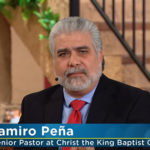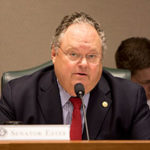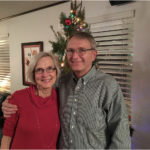SAN ANTONIO (ABP) — Powerless. That’s how Gavin Rogers felt when the police rousted him and his friends one morning in March as they slept under an interstate bridge, not to mention during the night he spent wrapped in a wet sleeping bag inside an abandoned shack being pounded by high winds, rain and hail — with twisters reportedly on the way.

Gavin Rogers, youth pastor at Trinity Baptist Church in San Antonio, hangs out with a homeless friend during Lent. (Photo by Bob Owen, San Antonio News-Express.)
|
“It’s a helpless feeling,” the youth pastor at Trinity Baptist Church in San Antonio posted March 20 on “40 Days of Haven,” a blog chronicling his experiences living as a homeless person during Lent.
Rogers says what began spiritual journey to deepen his relationship with God by imitating Christ has blossomed into a season of deeper questioning. Now he struggles with how to more fully live out the gospel and better serve marginalized individuals.
‘Where is God at work in our community?’
It’s a question that has no easy answer but is being asked by a growing number of individuals and churches nationwide, said Curtis Freeman, a theology professor and director of the Baptist House of Studies at Duke Divinity School
The answer begins with a simple question, Freeman said: “Where is God at work in our community?”
That can be determined by looking to the residents, schools and businesses immediately around them for the pressing needs in their communities. “It’s about paying attention to the communities around you,” Freeman said.
Sign up for our weekly edition and get all our headlines in your inbox on Thursdays
It’s what Rogers, who grew up Church of Christ before becoming Methodist then Baptist, said his Lenten journey was about. He spent time among the homeless during Lent because they spend much of their time on the downtown streets around Trinity Baptist.
Had his church been surrounded by affluent neighborhoods, the Lenten journey might have looked a lot different. “I see no difference between the pastor in the richest part of town playing a lot of golf with his parishioners than me being among the homeless,” he said.
‘Incarnational’ ministry
That’s the kind of approach ministry that Jimmy Dorrell calls “incarnational.” It means connecting with those in need through friendship and hospitality rather than handouts, said Dorrell, founder and executive director of Mission Waco.
Projects like Rogers,’ he said, also have their value for those spiritually equipped endure them. “I love those radical kids, the kids who can take a month to be homeless,” he said.
For others there are “poverty simulations” like those hosted by Mission Waco. They impose poverty conditions on participants on a secured property. “You come in on a Friday night and you’re poor till Sunday,” Dorrell said. “It’s transformative.”
‘It’s all about relationships’
But there’s also something about being there consistently, Dorrell added. That was the idea behind the creation of Church Under the Bridge, a congregation that worships under a bridge near Baylor University.
The congregation consists of a mix of college students and faculty, local professionals, the working poor and homeless. Like Mission Waco — and Rogers’ Lenten experience — the church is a way to break down stereotypes all these groups have about each other.
“It’s different than the traditional relief model,” said Dorrell. “It’s about relationships, and to do that you have to hang out with people.”
Humanize the homeless
Rogers knew all of that already. He attended Dorrell’s church when he was a student at Baylor and participated in the poverty simulations in Waco. Trinity Baptist already serves those in need around it, and he’s led youth group efforts to feed and comfort the homeless.
But now, Rogers said, he knows how much he didn’t know.
Like the homeless having cliques just like high schools do. Like the time they spend talking about romance drama and being preoccupied with constantly improving their real estate situations — even if it’s going from shelter to a private shed.
It also didn’t really dawn on him that they have names. He felt that in his heart when police referred to people named Jesse and William as bums and vagrants.
“I learned that we do not humanize the homeless,” he said. “Jesus humanized the homeless because he walked among them …and had no place to lay his head. I thought, what would it be like to walk among them?”
Despite the knowledge Rogers gained from being homeless for Lent, he’s not brimming with ideas on what to do next. And that, too, produces that feeling of uncertainty.
“I had a guy invite me to sleep in his shed, but would I let him sleep in my house?” Rogers asked. “I don’t know the answer to that, and that goes against me, not anyone else.”















We seek to connect God’s story and God’s people around the world. To learn more about God’s story, click here.
Send comments and feedback to Eric Black, our editor. For comments to be published, please specify “letter to the editor.” Maximum length for publication is 300 words.